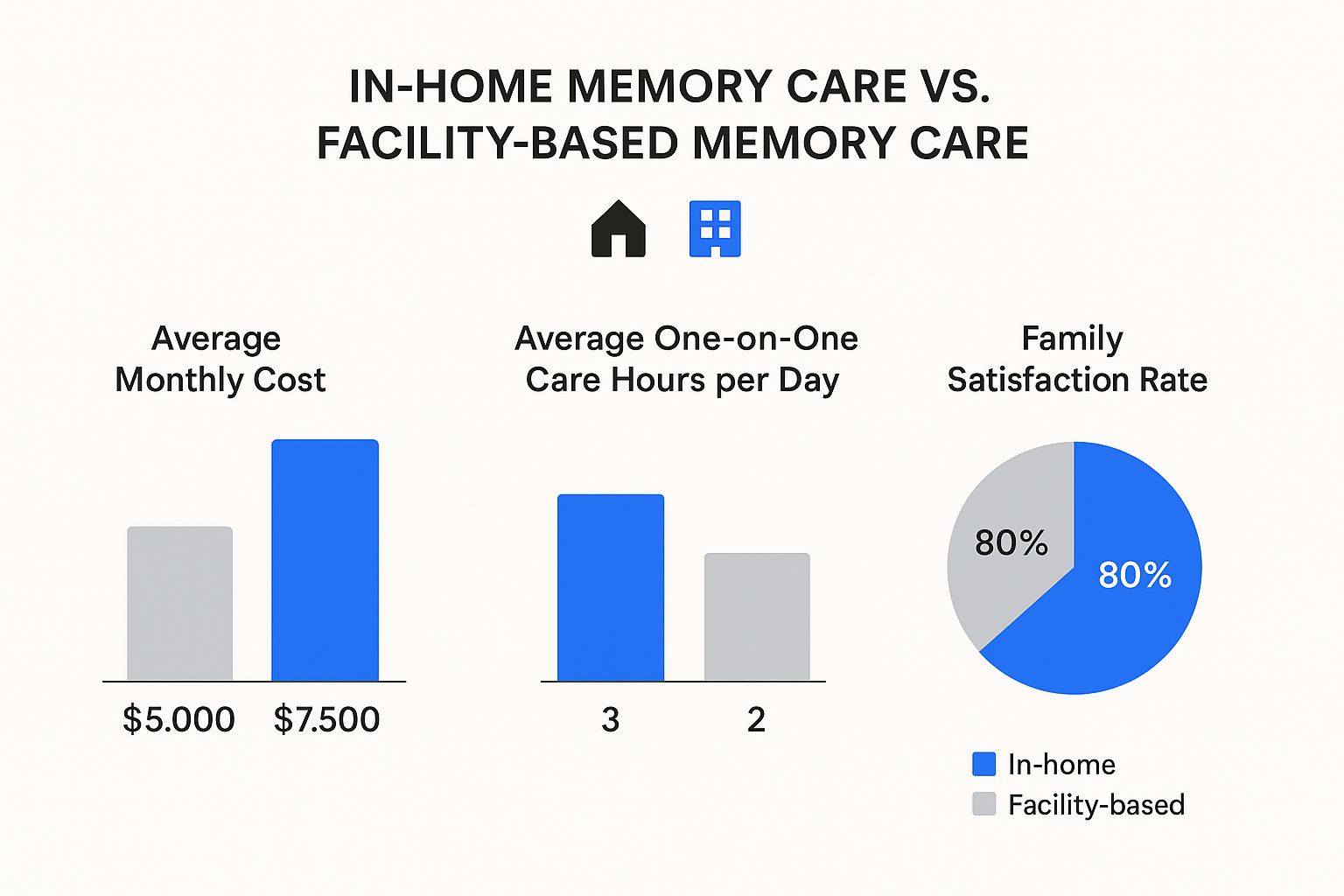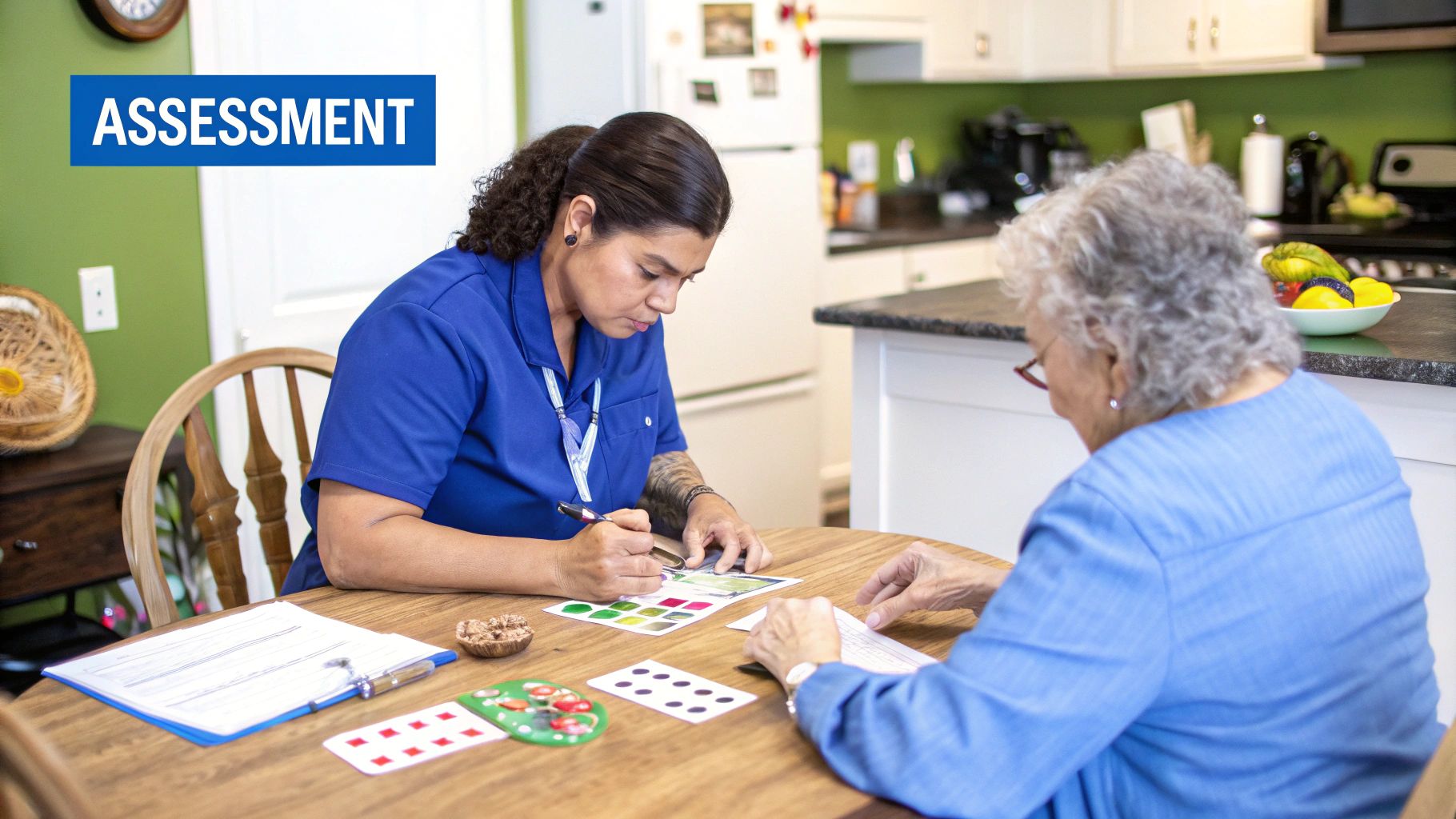The Essentials of In Home Memory Care
Understanding the core components of in-home memory care is the first step in making informed decisions for your loved one. This specialized care goes beyond standard home health assistance, addressing the unique cognitive, emotional, and physical needs of individuals with memory impairments. Care plans are dynamic, adapting and evolving alongside the progression of conditions like Alzheimer's and dementia.
Key Differences Between In-Home Memory Care and General Home Care
One of the most significant distinctions lies in the specialized training of memory care professionals. These caregivers are equipped with techniques for behavior recognition and adaptation strategies, preserving dignity throughout cognitive changes. This specialized approach focuses on creating a safe, supportive environment and fostering meaningful engagement. Providing care in the home requires a nuanced approach; for more on in-home care, read about the Home Wound Care Fundamentals.
To better understand the differences between in-home memory care and general home care, review the comparison table below. It outlines the key distinctions in services offered.
| Care Component | In Home Memory Care | General Home Care |
|---|---|---|
| Cognitive Stimulation | Personalized activities, memory games, reminiscence therapy | May not be included |
| Safety Supervision | Monitoring for wandering, fall prevention, medication management | Basic safety checks, assistance with mobility |
| Behavioral Management | Strategies for managing challenging behaviors associated with dementia | May not be equipped to handle dementia-related behaviors |
| Personal Care | Bathing, dressing, toileting with sensitivity to cognitive changes | Assistance with ADLs |
| Emotional Support | Companionship, emotional validation, and support for both the individual and family | Companionship and emotional support |
As the table highlights, in-home memory care provides specialized services tailored to the unique needs of individuals with cognitive impairments, going beyond the basic assistance offered by general home care.
The Growing Demand for In-Home Memory Care Solutions
The demand for in-home memory care and associated technologies is rapidly increasing. The global dementia care products market, encompassing tools like GPS trackers and adaptive wear, is projected to reach $33.3 million by 2025. This market is expected to further expand to $64.8 million by 2035. This growth is driven by the rising number of dementia cases worldwide, estimated to reach 139 million by 2050, a significant increase from 55 million in 2022. The COVID-19 pandemic further accelerated the adoption of remote monitoring devices as families prioritized home safety. You can find more detailed statistics from Future Market Insights here.
This trend reflects a growing preference for aging-in-place solutions and the increasing availability of digital health advancements. Fall sensors and reminder apps, for instance, now empower caregivers to manage daily routines more effectively. This highlights the growing need for comprehensive support systems that address the multifaceted challenges of memory-related conditions within the comfort of home. The following data chart visualizes these market projections:

As the data chart demonstrates, the market is experiencing substantial growth, with projections indicating continued expansion in the coming years. This underscores the increasing demand for in-home memory care solutions and the importance of technology in supporting these services. This suggests a shift towards providing specialized care within the familiar environment of home, empowering individuals to maintain their independence and quality of life.
Why Familiar Surroundings Transform Memory Care

The environment plays a vital role in successful memory care. Familiar surroundings can significantly lessen confusion and anxiety. This leads to a noticeable improvement in the quality of life for individuals experiencing memory impairments.
Unfamiliar institutional settings can worsen disorientation and distress. In-home memory care offers a significant advantage. It allows individuals to stay in the comfort and security of their homes.
The Power of Familiar Objects and Routines
Everyday objects in the home become strong cognitive anchors. These familiar items, from treasured photos to well-loved furniture, can trigger memories. They also offer a sense of stability.
For example, a favorite chair might bring back memories of relaxing with a book. This creates a sense of comfort and familiarity. This is difficult for facility-based care to reproduce.
Established home routines also help preserve independence. Individuals can manage daily life instinctively, even with changing cognitive function. The predictability of familiar routines provides stability and reduces anxiety. You might be interested in: How to master…
Transforming the Home into a Therapeutic Environment
Skilled in-home memory care providers transform living spaces into therapeutic environments. This involves adapting the home to individual needs. It also maintains a warm, inviting atmosphere. This approach strengthens existing cognitive connections and creates joyful moments. As part of in-home memory care, understanding resources for seniors is crucial. You can explore avenues like the benefits of CBD for seniors.
Practical Examples of Home as an Active Participant in Care
The home becomes an active participant in memory care, not just a setting. Simple changes, like clearly labeling drawers, can empower individuals. This helps maintain a sense of autonomy.
Similarly, incorporating familiar music and scents evokes positive emotions. This also stimulates memory. Integrating the home environment into the care plan creates a more personalized and effective approach.
These small adjustments significantly impact well-being and sense of self. They create a nurturing environment. This fosters both comfort and cognitive engagement.
Creating a Memory-Safe Home Without Institutional Feel

Safety is paramount in in-home memory care. But creating a secure environment shouldn't mean sacrificing the comforting, familiar feel of home. It's about finding a balance between necessary precautions and maintaining a sense of normalcy. The goal is fostering independence, not restriction.
Balancing Safety with a Home-Like Environment
Thoughtful modifications can actually enhance independence. By preventing accidents, we empower individuals to move more freely and confidently. Simple changes like removing clutter and installing grab bars in the bathroom can significantly reduce fall risks without creating a sterile, clinical atmosphere. This approach promotes both safety and dignity.
Incorporating elements of dementia-friendly design can also make a profound difference. Strategic lighting can minimize shadows and improve visibility, reducing confusion and anxiety. Intuitive color-coding on doorways or key objects can assist with navigation and wayfinding.
Practical Design Elements for Memory Care
Consider implementing these changes to cultivate a sense of security and well-being:
- Enhanced Lighting: Bright, even lighting minimizes shadows, especially in hallways and bathrooms, improving visibility and safety.
- Color-Coding: Using distinct colors for doorways or important objects can aid navigation and reduce confusion for those with memory impairments.
- Decluttering: Removing excess furniture and clutter creates clear pathways and minimizes tripping hazards, promoting safe movement throughout the home.
- Adaptive Equipment: Installing grab bars, shower seats, and raised toilet seats enhances safety and independence in the bathroom, making daily routines easier.
- Removing Triggers: Subtly removing items that might cause agitation or confusion can foster a calmer, more supportive environment.
These simple modifications help maintain a sense of normalcy and dignity while reducing potential hazards. This is crucial for successful in-home memory care. However, access to these vital modifications isn't always readily available.
The Global Challenge of Dementia Care
In-home dementia care remains underutilized globally. One in five patients receive no formal care, and family members provide up to 75% of caregiving, often without adequate support. Learn more about global dementia care access. By 2025, dementia-related healthcare costs in the U.S. alone are projected to reach $384 billion, excluding the substantial value of unpaid caregiving, estimated at $340 billion annually. This burden is worsened by inconsistent access to memory aids and safety modifications, particularly in low-income countries where dementia prevalence is higher.
Integrating Technology for Safety and Dignity
Technology plays a vital role in supporting a safe and comfortable home environment. Discreet door monitoring systems can alert caregivers to wandering, while medication management systems can ensure timely medication intake without sacrificing autonomy. These tools enhance safety without compromising independence.
Room-by-Room Assessment and Solutions
A room-by-room assessment can identify potential hazards and guide safety modifications. Securing loose rugs, installing window guards, and removing potentially harmful cleaning products creates a safer living space. In the kitchen, consider safety features like automatic shut-off appliances and clear labeling of cabinets. These adjustments significantly reduce risks and promote peace of mind. Creating a memory-safe home is an ongoing process that requires careful planning and attention to detail. It's a vital investment in the well-being and independence of individuals living with memory impairments.
What Sets True Memory Care Specialists Apart
Finding the right care for a loved one with Alzheimer's or other forms of dementia can feel overwhelming. It's important to understand the distinct qualities that differentiate memory care specialists from general caregivers. Not all caregivers possess the specialized skills and training necessary for effective memory care.
Specialized Training and Skillsets
True memory care specialists undergo rigorous training to equip them with the tools needed to support individuals experiencing cognitive decline. This training covers a wide range of topics, including advanced communication techniques, understanding the different stages of dementia, and implementing behavioral intervention strategies.
This specialized education helps them to deeply understand the complexities of interacting with individuals facing memory loss, confusion, and personality changes. For example, validation therapy, a communication technique that acknowledges and validates the feelings and experiences of individuals with dementia, is a key part of their training. These specialized skills greatly enhance the quality of care and contribute significantly to the individual's well-being.
Early Warning Systems and Subtle Changes
One crucial role of memory care specialists is their ability to act as early warning systems. They are trained to detect subtle changes in behavior, mood, or cognitive function that might otherwise go unnoticed. This keen observation is essential for timely intervention and allows for necessary adjustments to the care plan.
Catching these shifts early can prevent larger challenges from arising later. Their ability to recognize and address these subtle shifts is a cornerstone of effective in-home memory care. You might be interested in exploring available opportunities: Available positions for Memory Care Specialists
The Importance of Emotional Intelligence
Emotional intelligence is paramount in memory care. It’s the ability to build meaningful connections, even when memory and recognition fluctuate. This empathetic approach is fundamental to providing truly compassionate care. It requires patience, understanding, and a genuine desire to connect with the individual's unique experiences.
Responding to challenging behaviors with compassion instead of frustration takes a high degree of emotional intelligence. This understanding creates a supportive and secure environment, fostering trust between the caregiver and the individual receiving care.
Adapting to the Progression of Memory Conditions
Memory conditions are progressive, and care approaches must adapt accordingly. Memory care specialists are skilled in adjusting their strategies to meet the individual's evolving needs, ensuring personalized care remains consistent. This ongoing assessment and flexibility are key to tailoring care plans effectively.
This adaptability is crucial for ensuring care remains relevant, respectful, and effective throughout the various stages of memory decline. By continually adapting their approach, specialists provide consistent support and preserve the individual's dignity and quality of life. This dynamic approach is fundamental to high-quality in-home memory care.
To understand more about the qualifications of in-home memory care providers, review the table below.
Professional In Home Memory Care Provider Qualifications
This table outlines the specialized training, certifications, and skills to look for when selecting professional in-home memory care providers.
| Qualification Type | Description | Why It Matters |
|---|---|---|
| Dementia Care Certification | Specialized training focused on dementia care best practices. | Demonstrates a deep understanding of dementia-related challenges and effective care strategies. |
| CPR and First Aid Certification | Training in emergency medical response. | Ensures the provider can handle medical emergencies effectively. |
| Experience with Behavioral Management | Experience working with individuals exhibiting challenging behaviors associated with dementia. | Provides the ability to navigate complex behavioral situations with compassion and skill. |
| Excellent Communication Skills | Ability to communicate effectively with individuals with cognitive impairments, families, and medical professionals. | Facilitates clear and empathetic communication, promoting understanding and collaboration. |
| Emotional Intelligence | The ability to empathize, understand, and respond sensitively to the emotional needs of individuals with dementia. | Creates a positive and supportive care environment. |
These qualifications represent important factors to consider when choosing an in-home memory care provider. Finding a provider with these qualifications can greatly contribute to the well-being and quality of life for individuals living with dementia.
Supporting Family Caregivers Through Partnership

Effective in-home memory care focuses on the well-being of the entire family, not just the individual receiving care. This support system is essential for both the person with memory challenges and the emotional and physical health of their family caregivers. This section explores the vital partnership between families and professional in-home memory care services.
Preventing Caregiver Burnout
Family caregivers often face significant responsibilities, which can lead to burnout and exhaustion. Professional in-home memory care services offer respite care, providing family members with much-needed breaks. This time allows them to recharge and address their own personal needs.
This balance is crucial for maintaining long-term care. These breaks ensure caregivers can return to their roles feeling refreshed and better prepared to provide compassionate care. This support is vital for preserving their own well-being and preventing burnout.
Empowering Families with Knowledge and Skills
Leading memory care providers go beyond simply providing care; they educate. They empower families with practical communication techniques and behavior management strategies. For example, they might train family members on de-escalation techniques for challenging situations or how to use validation therapy.
These skills enable families to interact positively and meaningfully with their loved ones. This knowledge also reduces stress and increases confidence in managing various situations. This collaborative approach actively involves families in the care process.
Navigating the Emotional Challenges of Memory Loss
Memory conditions present complex emotional challenges for families, such as grief, guilt, and the stress of adapting to changing needs. Skilled memory specialists provide crucial emotional support and guidance as families navigate these difficulties.
They offer a safe space for families to discuss their feelings and concerns. This emotional support is invaluable in helping families cope with the emotional complexities of memory loss. This understanding and support strengthens the entire family unit.
Collaborative Care Planning: Building Strong Partnerships
Collaborative care planning creates a personalized care plan in partnership with the family. This ensures the plan aligns with the individual's specific needs, as well as the family's values and preferences. This shared decision-making strengthens the foundation for effective care.
Real family stories highlight the positive outcomes of these partnerships. One family described how their in-home memory care provider helped them create an activity plan incorporating their loved one's passion for gardening.
This provided meaningful engagement for the individual and allowed the family to connect with their loved one in a familiar and comforting way. This collaborative approach demonstrates the value of partnership in in-home memory care.
Practical Guidance for Building Essential Relationships
Open communication and regular feedback are essential for a strong partnership between professional and family caregivers. Regular check-ins and open discussions allow for adjustments to the care plan based on the individual's evolving needs.
This collaborative feedback ensures the care remains personalized, effective, and responsive. Clear communication channels build trust and understanding, leading to improved care outcomes and a stronger support system for both the family and the individual. This partnership forms the core of successful in-home memory care.
Meaningful Engagement: Beyond Basic Memory Care
In-home memory care truly shines when it goes beyond the essentials of safety and hygiene. It's about fostering genuine connection and joy. This means focusing on activities that stimulate cognitive function and bring about positive emotional responses, honoring the individual's identity and personal history.
Personalized Cognitive Activities: Transforming Daily Routines
Personalized cognitive activities are at the heart of effective in-home memory care. They transform everyday routines into opportunities for meaningful engagement. Instead of simply checking off tasks, these activities tap into individual interests and past experiences.
For example, someone who loved baking might find joy in helping prepare a simple recipe. This not only engages their cognitive abilities but also connects them to a cherished activity. This fosters a sense of purpose and accomplishment. Check out our guide on How to master…
The Therapeutic Power of Memory Books, Music, and Sensory Engagement
Memory books, filled with photos and personal stories, can spark conversations and bring back treasured memories. Music therapy has proven effective in reducing anxiety and improving mood, allowing individuals to connect with emotions through familiar melodies.
Sensory engagement activities, such as aromatherapy or tactile stimulation, offer another avenue for meaningful interaction. These activities provide comfort and stimulate different areas of the brain. This personalized approach ensures engagement remains relevant and stimulating.
Life Story Work: Connecting to Identity and History
Life story work is a valuable tool in in-home memory care. By piecing together memories and experiences, individuals can reconnect with their sense of self. This process also offers valuable insights for caregivers, enabling them to provide more personalized care.
This approach emphasizes the importance of preserving individual identity and personal history. These stories become a foundation of personalized care, enriching daily interactions. This helps to understand the person beyond their diagnosis.
Adapting Activities to Changing Abilities: Ensuring Success
As cognitive abilities change, it’s essential to adapt activities accordingly. Adjusting complexity and providing appropriate levels of support ensures success and prevents frustration. This allows individuals to maintain a sense of competence and self-esteem.
This could involve modifying a favorite game or breaking down a task into smaller, more manageable steps. These adaptations are crucial for ensuring continued engagement and meaningful participation. This flexible approach creates a positive and supportive environment.
Everyday Objects as Therapeutic Tools: Creating Bridges to Memories
Familiar household objects and personal mementos can become powerful therapeutic tools. A beloved book or a treasured photograph can trigger memories and spark conversations, acting as tangible links to the past.
For instance, holding a family heirloom might evoke a flood of positive memories, bringing a sense of comfort and connection. These personalized items are often more effective than generic memory prompts, offering a deeper emotional connection to the past.
Thoughtful Integration of New Technologies
New technologies can enhance cognitive stimulation. Digital memory albums and virtual reality experiences offer engaging and interactive ways to explore memories and connect with the world. However, it's vital to integrate these technologies thoughtfully, respecting individual preferences and abilities.
Technology can be a powerful tool, but it should complement, not replace, human interaction and connection. The focus should always remain on creating meaningful and engaging experiences.
Contact Caring Hands Senior Services today at https://caringhandsseniorservices.org to learn more about how our personalized in-home memory care services can support your loved one's well-being and enhance their quality of life.


